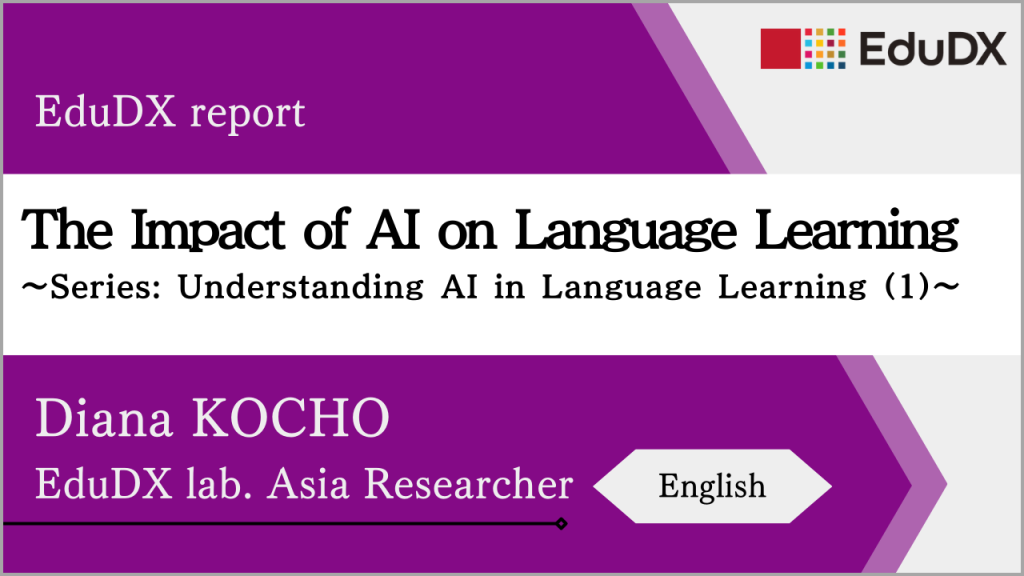The Impact of AI on Language Learning
〜 Series: Understanding AI in Language Learning(1)〜

24 October 2024 Diana KOCHO (Researcher of EduDX lab.Asia)
Introduction
In recent years, Artificial Intelligence (AI) has made significant advancements across various sectors, particularly in education. The pandemic accelerated the adoption of AI in language learning, as remote and online education became essential. AI technologies now offer more personalized, adaptive, and efficient learning experiences, contributing to substantial growth in this field. This report explores the expanding role of AI in education, focusing on technologies like Natural Language Processing (NLP), Speech Recognition, and Machine Learning, while examining practical applications and their impact on language learning.
Growing Role of AI in Education
Nowadays, Artificial Intelligence (AI) is rapidly transforming education, particularly in language learning, by offering personalized, adaptive, and efficient experiences. The global market for AI in education is expanding, projected to grow from USD 3.79 billion in 2022 to USD 20.54 billion by 2027 (Global Market Estimates, 2022). This growth highlights AI’s potential to revolutionize language learning through personalized lessons, real-time feedback, and immersive experiences.
AI Technology in Language Learning
Among the key AI technologies transforming language learning, three particularly stand out: Natural Language Learning Processing (NLP), Speech Recognition, and Machine Learning.
(1) NLP allows AI systems to understand and process human languages, enabling tools like grammar checker, translation systems, and conversational chatbots that help learners practice real-life interactions. Some Apps may sound familiar to you powered by NLP to deliver personalized lessons, such as Duolingo, Babbel, Mondly, etc..
(2) Speech recognition plays an important role in pronunciation training, giving learners instant feedback on their spoken language, and helping to improve their fluency. Those used in Apps like Ling, Rosetta Stone, FluentU and Google Assistant for language learning.
(3) Machine learning drives adaptive learning, analyzing learner performance to tailor lessons that suitable for individual needs.
While AI technologies like NLP, Speech Recognition, and Machine Learning offer significant advancements in language learning, they still face several challenges.
NLP struggles with understanding context, idiomatic expressions, sarcasm, and cultural nuances, which can limit its effectiveness. Speech recognition often fails to accurately process diverse accents and dialects, leading to potential mis feedback for non-native speakers.
Example of AI Powered Project
There are numerous examples of universities and institutions implementing AI in language learning. Here are two noteworthy cases:
The Open University’s AI Initiative: A £3 million AI project in partnership with the UK Department for Education aims to enhance learning outcomes and reduce educational inequalities. It focuses on developing AI-driven personalized learning resources, supporting teachers, and increasing access to education (The Open University, 2024).
Google’s AI in Language Learning: Google Assistant uses Natural Language Processing (NLP) and speech recognition for conversational practice, while Google Translate incorporates machine learning for real-time translation in over 100 languages, improving global language accessibility and proficiency
Conclusion
AI technologies like Natural Language Processing (NLP), Speech Recognition, and Machine Learning are revolutionizing language learning by offering personalized, efficient, and adaptive experiences. While challenges such as understanding accents, cultural nuances, and context remain, AI continues to play a transformative role in education. Institutions like The Open University and Google are leading the way, using AI to improve learning outcomes and increase accessibility. In the next report, we will dive deeper into the specific benefits and challenges of AI in language learning. Stay tuned for more insights!
参考文献
Global Market Estimates. (2022). AI in education market: Forecast to 2027
https://www.globalmarketestimates.com/market-report/ai-in-education-market-3891#:~:text=The%20global%20AI%20in%20education,45.6%25%20from%202022%20to%202027.
The Open University. (2024). The Open University and Department for Education launch £3m AI initiative to improve educational tools.
https://www.open.ac.uk/blogs/news/around-ou/university-news/the-open-university-and-department-for-education-launch-3m-ai-initiative-to-improve-educational-tools
Artificial Intelligence in Language Learning: What Are We Afraid of. (2022)
https://files.eric.ed.gov/fulltext/EJ1363313.pdf
Natural language processing: state of the art, current trends and challenges. (2023)
https://link.springer.com/article/10.1007/s11042-022-13428-4
